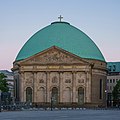Berlin-Mitte
Mitte proper comprises the historic center of Old Berlin, with the medieval churches of St. Nicholas and St. Mary, the Museum Island, city buildings (Rotes Rathaus and Altes Stadthaus), the Fernsehturm, and the Brandenburg Gate, along the central boulevard of Unter den Linden. For these reasons, Mitte is considered the "heart" of Berlin.
History

Mitte comprises the historic center of Berlin (Altberlin and Cölln). Its history thus corresponds to the history of the entire city until the early 20th century, and with the Greater Berlin Act in 1920 it became the first district of the city. It was among the areas of the city most heavily damaged in World War II.
Following a territorial redeployment by the Soviet Union and the United Kingdom that reshaped the borders of West Berlin's British Sector in August 1945, the western part of Staaken became in effect as of 1 February 1951 an exclave of Mitte, then still a borough of East Berlin. This ended on 1 January 1961, when western Staaken was incorporated into then East German Falkensee, which had already been under its de facto administration since 1 June 1952.
Between 1961 and 1990, Mitte, one of the most important boroughs of East Berlin but close to all three western sectors of the city, was almost surrounded by the Berlin Wall. One of the most important border crossings was Checkpoint Charlie, near Kreuzberg.
Geography
Position
Situated in central Berlin and mostly in its old town, it is traversed by the river Spree. It borders the localities (Ortsteile) of Tiergarten, Moabit, Wedding, Gesundbrunnen (all in Mitte district), Prenzlauer Berg (in Pankow district), Friedrichshain, and Kreuzberg (both in Friedrichshain-Kreuzberg district).
Subdivision
Mitte is subdivided into 13 zones or neighborhoods (Stadtviertel) (the numbers refer to the map above right):
- Cölln (1)
- Museum Island (1a)
- Fisher Island (1b)
- Alt-Berlin (2)
- Nikolaiviertel (2a)
- Friedrichswerder (3)
- Neukölln am Wasser (4)
- Dorotheenstadt (5)
- Friedrichstadt (6)
- Luisenstadt (7)
- Stralauer Vorstadt (8)
- Alexanderplatz (9)
- Spandauer Vorstadt (10)
- Scheunenviertel (10a)
- Friedrich-Wilhelm-Stadt (11)
- Oranienburger Vorstadt (12)
- Rosenthaler Vorstadt (13)
Sister cities
Main sights
Buildings and structures
- Alte Nationalgalerie
- Altes Museum
- Altes Stadthaus
- Berlin Cathedral
- Berlin Palace with the Humboldt Forum
- Berlin State Opera
- Berliner Ensemble
- Brandenburg Gate
- Bode Museum
- Bundesrat of Germany
- Checkpoint Charlie
- Deutscher Dom
- Fernsehturm Berlin
- Französischer Dom
- Friedrichstadt-Palast
- Friedrichswerder Church
- Humboldt University
- James Simon Gallery
- Kino Babylon
- Konzerthaus Berlin
- Kunsthaus Tacheles
- Marienkirche
- Neue Synagoge
- Neues Museum
- Nikolaikirche
- Palast der Republik
- Pergamon Museum
- Reich Air Ministry
- Rotes Rathaus
- St. Hedwig's Cathedral
- Sophienkirche
- Staatsratsgebäude
- Stadtschloß
Places, squares and streets
Photogallery
-
Brandenburg Gate
-
Fernsehturm
-
Rotes Rathaus
-
Alexanderplatz
-
Unter den Linden
-
Humboldt University of Berlin
-
Museum für Naturkunde
-
Potsdamer Platz
-
Pergamon Museum
-
Berlin Cathedral
-
Inside Berlin State Opera
-
Nikolaikirche
-
Nikolaiviertel
-
Berlin Palace with the Humboldt Forum
-
Museum Island
-
St. Hedwig's Cathedral
-
Neue Synagoge
-
Gendarmenmarkt with Französischer Dom and Konzerthaus
-
Deutscher Dom
-
Kunsthaus Tacheles
-
Checkpoint Charlie on Friedrichstrasse
-
Sophie-Gips-Höfe
Transportation

Mitte is served by S-Bahn lines S5, S7, S75, S9 (both on Berlin Stadtbahn); S1, S2, S25, and U-Bahn lines U2, U5, U6 and U8, as well as numerous tram and bus lines.
See also
- Berlin Alexanderplatz railway station
- Berlin Friedrichstrasse railway station
- Berlin Potsdamer Platz railway station
References
- ^ "Einwohnerinnen und Einwohner im Land Berlin am 31. Dezember 2023". Amt für Statistik Berlin-Brandenburg. February 2024.
- ^ (in German) Historical infos about Mitte
External links
![]() Media related to Berlin-Mitte at Wikimedia Commons
Media related to Berlin-Mitte at Wikimedia Commons























